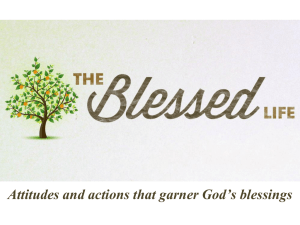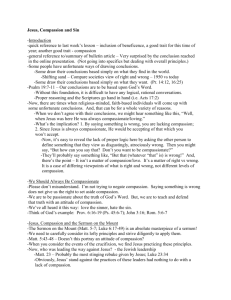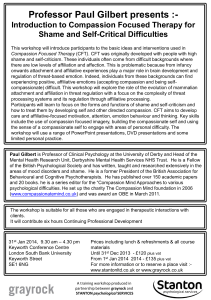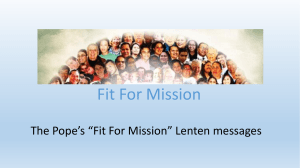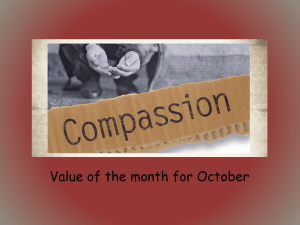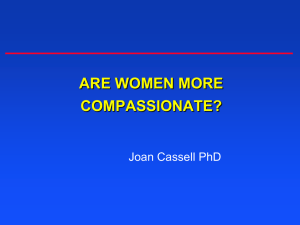2-22-14 Called to be Compassionate
advertisement
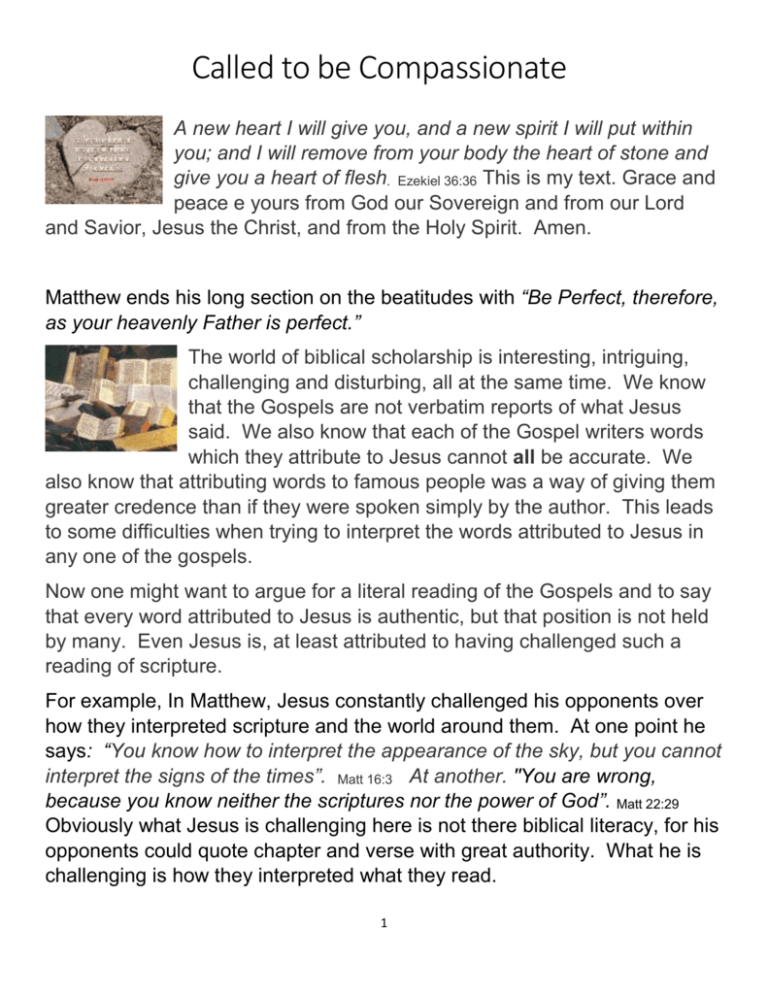
Called to be Compassionate A new heart I will give you, and a new spirit I will put within you; and I will remove from your body the heart of stone and give you a heart of flesh. Ezekiel 36:36 This is my text. Grace and peace e yours from God our Sovereign and from our Lord and Savior, Jesus the Christ, and from the Holy Spirit. Amen. Matthew ends his long section on the beatitudes with “Be Perfect, therefore, as your heavenly Father is perfect.” The world of biblical scholarship is interesting, intriguing, challenging and disturbing, all at the same time. We know that the Gospels are not verbatim reports of what Jesus said. We also know that each of the Gospel writers words which they attribute to Jesus cannot all be accurate. We also know that attributing words to famous people was a way of giving them greater credence than if they were spoken simply by the author. This leads to some difficulties when trying to interpret the words attributed to Jesus in any one of the gospels. Now one might want to argue for a literal reading of the Gospels and to say that every word attributed to Jesus is authentic, but that position is not held by many. Even Jesus is, at least attributed to having challenged such a reading of scripture. For example, In Matthew, Jesus constantly challenged his opponents over how they interpreted scripture and the world around them. At one point he says: “You know how to interpret the appearance of the sky, but you cannot interpret the signs of the times”. Matt 16:3 At another. "You are wrong, because you know neither the scriptures nor the power of God”. Matt 22:29 Obviously what Jesus is challenging here is not there biblical literacy, for his opponents could quote chapter and verse with great authority. What he is challenging is how they interpreted what they read. 1 Every translation is an interpretation of the text. The final sentence of the Gospel lesson for today is a case in point. Matthew, in the NRSV says we are to “Be Perfect, therefore, as your heavenly Father is perfect”. In Luke, the parallel passage is translated as “Be merciful, even as your heavenly Father is merciful.” Luke 6:36 The translation in the Scholars Version of these passages have an altogether different feel. Before we listen to their translation I invite you to consider for a moment, the difference between “Be Perfect, therefore, as your heavenly Father is perfect” and “Be merciful, even as your heavenly Father is merciful.” There is, at least for me, a world of difference between being perfect and being merciful. Now listen to how the Scholars Version translates these two respective passages. First Luke 6:36 “Be Compassionate, even as your heavenly Father is compassionate.” And Matthew 5:48 The Scholars Version reads: “To sum up, you are to be unstinting in your generosity in the way your heavenly Father’s generosity is unstinting.” We have these various rending’s of the words handed down to us from the tradition. And the questions before us are “how do we interpret them? How do we hear them” “How do they serve as guides for us in our own journey of faith. Marcus Borg, makes the point that “often Hebrew words for compassion and compassionate are translated into the English as mercy and merciful. But compassion is quite different from mercy , and being compassionate quite different from being merciful. In English, mercy and merciful most commonly imply a superior in relationship to a subordinate, and also a situation of wrongdoing: one is merciful toward somebody to whom one has a right (or power) to act otherwise. Compassion suggests something else. To paraphrase William Blake, mercy wears a human face, and compassion a human heart.” 2 The Hebrew word for “compassion” whose singular form means “womb” is often used of God in the Old Testament. It is translated as “merciful” in the characterization of God as “gracious and merciful.” It is present in that quite wonderful expression from the King James Bible the “tender mercies” of God. The concept of “God as compassionate is rooted deep within the Hebrew tradition. Thus to say God is compassionate is to say God is “womb-like” God cares deeply for creation as a mother cares for the offspring of her womb. That is God is moved deeply by the affairs of human kind. So the essence of these passages, both Matthew’s “be Perfect” and Luke’s “be merciful” is calling us to become more “womb like” just as God is. We are called to be moved by the pain and brokenness of this world. To feel it deeply as a woman feels in her womb. Or to feel as God feels and to act as God acts: in a life-giving and nourishing way. Perfection conjures up lists of rights and wrongs, of rules and regulations. Perfection then becomes a matter of living up to the letter of the law. This is precisely what Jesus accuses the Pharisees of doing, all the while missing the spirit of the law. Woe to you, scribes and Pharisees, hypocrites! For you tithe mint, dill, and cummin, and have neglected the weightier matters of the law: justice and mercy and faith. Matthew 23:23 So how do we act compassionately? We may not resonate well with the language of “Womb” but scripture also locates deep emotions in the Heart. In fact Pharaoh is characterized in the Hebrew scriptures as having a hard heart. When you read the exodus story you will come across the refrain: “that God hardened Pharaoh’s heart” . As a child I often wondered why God would do that. Later I learned that while the action is stated as God’s action, the reality is that one hears the word of God from within one’s own context. Thus the same word, which may be good news to the poor is threat to the wealthy. Consider Mary’s Magnificat which says: 3 God has “shown the strength of God’s arm, God has scattered the proud in the imagination of their hearts, God has put down the mighty from their thrones, and exalted those of low degree; God has filled the hungry with good things, and the rich God has sent empty away. Luke 1: 51-53 It is the same Gospel to rich and poor alike, yet it sounds and feels quite differently depending on your status in life. But here’s the point. It is “Good News” to both rich and poor! The rich are set free from their bondage to wealth and the poor are given sustenance and life. One Gospel, perceived differently from one’s point of view. So if we suffer from Pharaoh’s disease, a hard heart, compassion becomes the remedy that sets us free. But how do we get there? There are a variety of ways to engage one’s spiritual side. There are collective practices such as hearing the “sacred story” in the lessons of the day, or participating in Sacred Rituals such as celebration of the sacraments Baptism and Holy Communion, or observing sacred time, Sunday mornings, sacred music such as favorite hymns or liturgy, sacred speech such as prayer. There are also numerous individual practices, such as private devotions, journaling, and prayer. Or there is a quite different path leading to the opening of the heart; that of deeds of compassion, feeding the hungry, clothing the naked, visiting the sick or imprisoned, embracing the homeless, opening of doors and removal of obstacles for the immigrant. The list is endless. The difference between mercy and compassion, is that mercy comes from a hierarchical top down structure, while compassion says that we are all in this together. One of the things about facing a draught in California, is that it makes it abundantly clear that we are all in this together. This is not about rich or poor, black or white, native or immigrant, gay or straight or any 4 other artificial way of dividing up society. We are all in this together. We can feel for our neighbors plight because we can easily see ourselves in the very same situation. Feelings and compassion are easy when we find ourselves in the same boat. What makes compassion and justice difficult is when we are so removed from a situation that we cannot see ourselves in that situation. Then it is difficult to feel empathy for others. Then rather than sharing concerns about a global village we see things from the point of view of privilege and entitlements and we seek to preserve what we have at the expense of others. This is just the opposite of compassion. Compassion seeks the well-being of others no matter what the costs to self. It is the very essence of taking up ones cross and following Jesus on the way. As a congregation we have set aside every month with a fifth Sunday as an opportunity for us to give beyond our own budget needs and constraints. At our annual meeting, along with our annual report each of you were given a “Good Gifts catalogue.” It is broken down into sections, one of which deals with water. While we are in the midst of a draught in California, is a perfect time for us to consider what devastation comes from lack of water. In the Central African Republic, one out of every four or five children die before the age of five. Almost all of it is caused by either water borne diseases or Malaria. All things that are treatable. Why should children be dying? 5 Over the next few Sundays, may I ask you to take the Good Gifts Catalogue and look at pages 8-9, the section dealing with water. May I ask you to consider in addition to the steps that you will take to help relieve the draught in California, things like only watering your landscape once a week, or even letting it go brown, things like taking only 3 or 4 minute showers, things like not letting the water run when you brush your teeth or shave, that in addition to those things you consider the global implications of water, and have compassion on those for whom lack water is a matter of life and death, not merely an inconvenience. I have encouraged you to consider giving special gifts of thanksgiving for birthdays, anniversaries, or just because. Now I want to encourage you to make fifth Sunday offerings a part of that strategy. Could we as a people of faith, consider giving a congregational good gift of a water well for the year 2014. Learn about water in a global village. Have compassion for those who find themselves with not enough potable water for sustaining life. It’s a matter of the heart. May our prayer be “Give us a new heart, O God, and put within us a a new spirit. remove from our bodies the hearts of stone and give to us hearts of flesh. Ezekiel 36:36 May you and I: “Be Perfect, therefore, as our heavenly Father is perfect” May we: “Be merciful, even as our heavenly Father is merciful.” May we: “….be unstinting in our generosity in the way our heavenly Father’s generosity is unstinting.” 6 Finally may we: “Be Compassionate, even as our heavenly Father is compassionate.” For we are called to be compassionate! Amen 7

